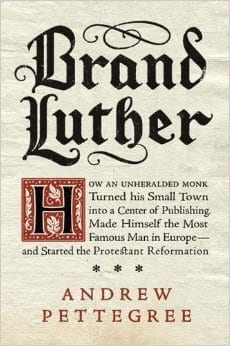I have read another book by Andrew Pettegree — Reformation and the Culture of Persuasion — which I really enjoyed, and I enjoyed this one even more. Brand Luther is well-researched, scholarly, detailed . . . and an easy read.
Think of it as a mash-up of history and biography written from the vantage of the early German printing industry. The carrier of the Reformation was books, and how that came to be is the story that this book tells.
It is commonly thought that the invention of printing resulted in the Reformation, and there is something to that. But at the same time, a few steps are left out. After the invention of printing in the first half of the fifteenth century, there was a good seventy years of fairly anemic publishing before the Reformation exploded. During that seventy years, the printing industry managed to survive printing scholarly works in Latin for scholars to read in Latin.
What Pettegree shows is that in a very real way, the Reformation “made” publishing. Luther was the first celebrity author, and he wrote in German, and he was interesting, and his output was prodigious. Many know about the high-talent that surrounded Luther on the theological front — the name Melanchthon comes to mind — but Pettegree shows how greatly Luther was aided competence in other areas. There was the artistic contributions of Cranach, and the publishing expertise of Lotter, and the political help provided by the Protestant princes.
Many know that Luther was afflicted by those who would trumpet their own radical vision and version of what Luther was supposed to be up to. There was Karlstadt, a well-meaning friend who outran his own headlights. There were the Zwickau “prophets” — of whom Luther once said that he did not care if they had swallowed the Holy Ghost, feathers and all. There was the extremism that broke out in the Peasants Revolt. All of these things did damage to the cause of reformation.
But Luther was also afflicted by publishing incompetence. The first printing shop that existed in Wittenberg was run by a man who was in well over his head. Luther had high aesthetic standards, and would spend time in the printing shops walking the productions through. Luther paid attention to his brand.
And he did it without becoming a celebrity sophist. When modern Christians talk about “brand,” or “platform,” or “marketing strategies,” it is easy for those who want to stand for a “pure gospel” to dismiss all such considerations as worldly and beneath contempt. The reason it is easy to do is because these considerations are so frequently detached from any care about what the Bible actually teaches. The truth and public relations are relegated to two different departments, and the end result is “brand sophistry.”
This is a real problem for us, now as much as ever. Modern pastors and Christian leaders should want to know the truth first. The exegesis should be done first. We should know what God has revealed first. Then, having established that, we should throw ourselves into the pursuit of excellence as we seek to advance the truth by every lawful means. For anyone who cares about this sort of thing, the book Brand Luther is a must. It is an enjoyable read, and rich with opportunities for thoughtful application.



This book is fantastically well timed!
It seems we are living through a moment in time akin to Luther’s rise. A man of similar temperment and communicative ability has seized upon and completely mastered existing, somewhat staid, techology (cable news, presidential debates, Twitter, etc.), harnessing it in previously unfathomable ways to promote his brand and overthrow the existing, out-of-touch-with-the-common-man establishment.
We live in interesting times indeed!
Wait, are you comparing Trump to Luther here!? Or am I just paranoid and seeing Trump everywhere?
Trump is following the same playbook as Luther: 1) Employ mockery and low humor against those in power. It entertains the audience and discombobulates the target. 2) Insult and demean those who oppose you, being sure never to be bested in that regard. 3) Extravagantly praise those who agree with you. 4) Forcefully condemn what you want to get rid of – be vague on the details of what will replace it. 5) Brand your name. Reading letters from the 1520’s is eerily similar to reading tweets and articles from the last few days. From his opponents, shock and incomprehension… Read more »
How Trump is doing to Twitter what Luther did to the printing press, from a journalist watching it happen: https://twitter.com/7im/timelines/704739478208839680 2. He's got now 6.5 million followers. That's about the same audience as CBS's nightly news— Tim Dickinson (@7im) March 1, 20163. Political journalists live on Twitter. (Guilty.) We lurk here, joke here. It's where conventional wisdom percolates and then congeals— Tim Dickinson (@7im) March 1, 2016 … 10. And the way Trump uses Twitter feed to drive/amplify/tweak/walk-back/push-further-over-the-line the free Cable TV media – it's masterful— Tim Dickinson (@7im) March 1, 201612. But @realDonaldTrump is in the sausage factory with… Read more »
Interesting stuff. I think it was the combination of several factors that “made” the Reformation. Publishing is certainly one of them, but so was the growth of the merchant class, nationalist resentment (particularly in Germany), etc.